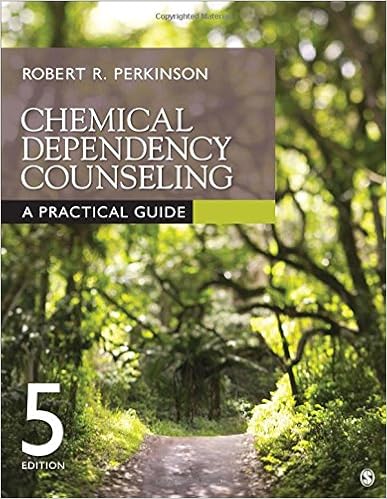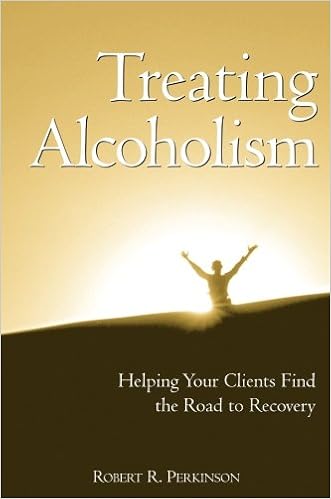Alcohol Dependence
Dr. Robert R. Perkinson specializes in alcoholism treatment, drug abuse treatment, teen drug abuse treatment, and problem gambling treatment. I have been treating alcoholics and addicts for over 30 years and have written the leading treatment manual for addiction counselors in the world. I thought I would give you an opportunity to learn more about addiction.
Acute Alcoholism Drug Withdrawal
To make a diagnosis, use the criteria listed in the current edition of the Diagnostic and Statistical Manual of Mental Disorders (DSM), published by the American Psychiatric Association. Order a copy of this from The American Psychiatric Association, 1400 K Street, N.W., Washington, DC. 20005. A new edition comes out every few years so there will be changes in the criteria from time to time . If you are unsure of your abilities to use the diagnostic criteria, an instrument such as the Structured Clinical Interview for DSM-5 (First, Spitzer, Gibbon, & Williams, 2001) is the most readily available battery used in clinical evaluation :
A pattern of alcohol use leading to significant impairment manifested by at least two of the following symptoms within a 12-month period:
1. Had times when you ended up drinking more, or longer, than you intended? More than once wanted to cut down or stop drinking, or tried to, but couldn’t?
2. Craving. A strong desire to drink.
3. Spent a lot of time drinking? Or being sick or getting over other aftereffects? Wanted a drink so badly you couldn’t think of anything else?
4. Found that drinking—or being sick from drinking—often interfered with taking care of your home or family? Or caused job troubles? Or school problems?
5. Continued to drink even though it was causing trouble with your family or friends?
6. Given up or cut back on activities that were important or interesting to you, or gave you pleasure, in order to drink?
7. More than once gotten into situations while or after drinking that increased your chances of getting hurt (such as driving, swimming, using machinery, walking in a dangerous area, or having unsafe sex)?
8. Continued to drink even though it was making you feel depressed or anxious or adding to another health problem? Or after having had a memory blackout?
9. Had to drink much more than you once did to get the effect you want? Or found that your usual number of drinks had much less effect than before?
10. Found that when the effects of alcohol were wearing off, you had withdrawal symptoms, such as trouble sleeping, shakiness, restlessness, nausea, sweating, a racing heart, or a seizure? Or sensed things that were not there?C
11. Tolerance: A need for markedly increased amounts of alcohol to achieve the desired effect.
12. Withdrawal : Automatic hyperactivity sweating, pulse greater than 100 bpm, hand tremor, insomnia, nausea, anxiety.
If you think that you or someone you love has a problem with alcohol, drugs or gambling, the fact that you are reading this page is an incredible victory. It means you are thinking about getting help. Congratulations! An addict has only two choices get into recovery or die.
The first thing you need to do is see if there is an addiction problem. Answer these questions and be honest with yourself. You can answer the questions for yourself or the person you are concerned about. You have nothing to hide and nobody is going to know the results but you.
Has the person ever tried to cut down on his or her use?
Have people annoyed the person by talking to him or her about the use?
Has the person ever felt bad or guilty about his or her use?
Has the person ever used alcohol or drugs in the morning or broken the law to use?
Two or more of these questions answered yes indicates probable addiction. That means you are in trouble and you need help. Only 4% of addicts can quit on their own for the next year.
It is not just the addict who suffers. Everyone associated with an addicted person is under terrible stress. This will just get worse until you get into treatment. If you or someone you love is addicted, you need to take action now! Don't let someone die because you stalled. I know you are afraid, but you don't have to be.
If you are an addict, or live with one, you are in great pain. Most addicts die of their addiction and they take their family members down with them. The first step in recovery is to get honest with yourself. Don't just sit there and think things are going to get better. Addiction doesn't get better. It gets worse until somebody dies. You need to take action and you need to take action now. The worst thing you can do is wait. How are you going to feel if this person kills someone in an accident or kills themselves? Don't let this happen to your family. It's time to get help. Many patients are state funded or come into treatment under Medicaid. If you are worried about the money, don't let that stop you. Money is the least of your worries. The money is not going to kill anyone and addiction kills everyone. Let us help you find a treatment you can afford. If you are an addict or if you live with one you are living in hell, you have no peace. Nothing you have tried works and you keep returning to the pain.
Find a treatment facility near you
 Chemical Dependency Counseling: A Practical Guide, Fifth Edition: is a best-selling comprehensive guide for counselors and front-line professionals who work with the chemically dependent and addicted in a variety of treatment settings. The text shows the counselor how to use the best evidence-based treatments available, including motivational enhancement, cognitive behavioral therapy, skills training, medication and 12 step facilitation. Guiding the counselor step-by-step through treatment, this volume presents state-of-the-art tools, and forms and tests necessary to deliver outstanding treatment and to meet the highest standards demanded by accrediting bodies.
Chemical Dependency Counseling: A Practical Guide, Fifth Edition: is a best-selling comprehensive guide for counselors and front-line professionals who work with the chemically dependent and addicted in a variety of treatment settings. The text shows the counselor how to use the best evidence-based treatments available, including motivational enhancement, cognitive behavioral therapy, skills training, medication and 12 step facilitation. Guiding the counselor step-by-step through treatment, this volume presents state-of-the-art tools, and forms and tests necessary to deliver outstanding treatment and to meet the highest standards demanded by accrediting bodies.
 The Alcoholism and Drug Abuse Client Workbook, Third Edition:An evidence-based program that uses treatments including motivational enhancement, cognitive-behavioral therapy, skills training, medication, and 12-step facilitation. It provides a venue for clients to write down their thoughts and experiences as they progress through treatment.
The Alcoholism and Drug Abuse Client Workbook, Third Edition:An evidence-based program that uses treatments including motivational enhancement, cognitive-behavioral therapy, skills training, medication, and 12-step facilitation. It provides a venue for clients to write down their thoughts and experiences as they progress through treatment.
 The Gambling Addiction Client Workbook, Third Edition:An evidence-based program that uses treatments including motivational enhancement, cognitive-behavioral therapy, skills training, medication, and 12-step facilitation. This workbook walks clients through self-reflective activities and exercises meant to help them recognize the underlying motivations and causes of their gambling addiction and to learn the tools necessary for recovery. The Third Edition of this workbook includes coverage of all 12 steps of recovery. Chapters focused on honesty and relapse prevention as well as a personal recovery plan contribute to client success.
The Gambling Addiction Client Workbook, Third Edition:An evidence-based program that uses treatments including motivational enhancement, cognitive-behavioral therapy, skills training, medication, and 12-step facilitation. This workbook walks clients through self-reflective activities and exercises meant to help them recognize the underlying motivations and causes of their gambling addiction and to learn the tools necessary for recovery. The Third Edition of this workbook includes coverage of all 12 steps of recovery. Chapters focused on honesty and relapse prevention as well as a personal recovery plan contribute to client success.
Treating Alcoholism: Helping Your Clients Find the Road to Recovery:
Alcoholics are one of the most difficult client groups to treat effectively. To preserve their way of life, they may lie about their problem or deny that one exists; that is the nature of this profoundly powerful disease. Yet if you can guide each of your clients through their own resistance towards the truth, not only will you be rewarded with starting them on the road to recovery, you will no doubt have saved their life as well. Achieving such a victory goes to the heart of being an addiction counselor; it is the experience of healing on a direct and tangible level.
Treating Alcoholism provides a complete road map for assessing, diagnosing, and treating this multifaceted and tenacious illness. Detailed clinical information on the disease accompanies ready-to-use tools for practice. With a special emphasis on the 12 Steps of Alcoholics Anonymous, the author walks you through the first five steps of this established methodology in comprehensive detail, showing how to easily apply each one to treatment.
The Big Book of Alcoholics Anonymous says that only God can relieve the illness of addiction. Here are a few spiritual tools to help you:
Trevor Howard, the sheriff of Teton County Wyoming, is contemplating an explosion of cocaine addiction, four structure fires and the murder of a six-year-old boy in his jurisdiction. The boy had a wooden cross penetrating his heart indicating a possible religious connection. Trever has the idea of hiring a young woman deputy with experience in undercover narcotics investigation. Simultaneously, Doctor Abe Anderson, Trevor’s best friend, meets Heather Cutler, acting in a play as the red headed demon of seduction. Abe falls in love with her and even more with his first experience with cocaine. Trevor is usually a confident police officer but these crimes, coming all at once, leave him feeling deeply troubled. Before it’s done his whole life, friendships and family will show him how terribly he has underestimated his greatest fears.
Joan Worthing has a new job as a seasonal ranger in Yellowstone National Park. She is hoping to escape a long history of physical and sexual abuse by her brother Teddy who is schizophrenic. Teddy escapes from a mental hospital and rushes to find her. He believes she must have his child who will save the world from an alien invasion. He is desperate to find Joan and save the world. Doctor Rand Holland, a psychologist in new recovery from alcoholism, becomes involved in the search for Teddy and the protection of Joan. One of Rand’s teenage patients Lela Lander runs away from home seeking help from Rand. She becomes involved with a Satanic coven in Denver run by Lonn Majors. All these characters meet in Yellowstone as the coven holds a Halloween ritual sacrifice that will bring Satan to earth for the ultimate battle between good and evil.











